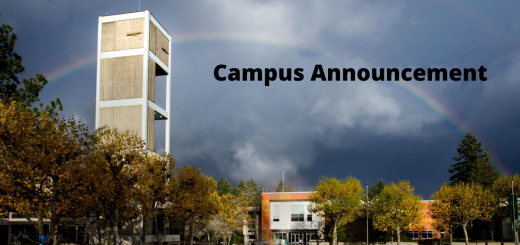Recast | Student conduct and employee safety
From: Academic Deans <deans@evergreen.edu>
Date: Friday, April 23, 2021 at 1:09 PM
Dear colleagues,
We want to share some information and resources for you regarding student behavior concerns.
We appreciate the fact that Evergreen educators take a supportive and asset-based approach to our students. Social, political, and personal crises will continue to impact students and our learning communities, classrooms, and workplaces. We want you to have as much support as possible in addressing student behaviors that cause concern or result in disruption.
We care about you and your safety. In spring 2019, Academics instituted a process for supporting targeted staff and faculty (attached). The protocol responds to external threats, but it contains some approaches you may want to pursue with your dean or supervisor if you are concerned about student behavior.
If you have follow-up questions, please don’t hesitate to ask. We always appreciate check-ins, even if you’re not sure whether the situation will escalate. We are also happy to consult with you about syllabi/program agreement/community agreement language.
Sincerely,
Your academic deans
Employee safety. All members of the faculty bargaining unit are represented by the UFE and are entitled to have a union steward support them in discussions about their work at the College, including interactions with students. Employees represented by WFSE and SSSSU have specific rights expressed in their contracts. All staff, including those working in exempt positions, are protected under state and Federal laws. Please consult your supervisor, union steward and Human Resource Services for more information. All employees who are experiencing harassment or discrimination based on their membership in a protected class are encouraged to contact Lorie Mastin, the college Affirmative Action and Equal Opportunity Officer.
Mental health. All students may seek medical & counseling support from Student Wellness, though as many of you know, students may need elevated and long-term support not available through our college counseling services, which are designed for short-term needs. In the case of ongoing mental health needs, Student Wellness staff refer students to other community resources.
In support of equity and in compliance with laws pertaining to ADA protections, mental health dynamics cannot be used to exclude students from educational opportunities, programs, or services. Situations which involve behavior in violation of the Student Conduct Code can be adjudicated. In these situations, efforts are made to work with students to support voluntary action when possible and appropriate.
CARE team. Many of you already use the CARE team reporting system to solicit support for students who are struggling academically, behaviorally, or personally. The CARE team is made up of staff and administrators from across departments who take a collaborative approach to addressing student issues.
Student rights and responsibilities. Student behavior which is prohibited at Evergreen is outlined in the Code of Student Rights & Responsibilities (Code). Reports of possible Code violations can be made directly to Student Rights & Responsibilities (SRR), which manages complaints about students’ behaviors which may have violated the Code. The flow chart attached explains the process of interacting with the Code, but here are some other elements to consider when you are deciding on your response to a particular situation:
- Evergreen’s resource for immediate emergency response is the police; for imminent threats of harm to self or others, please contact dispatch at (360) 867-6140 or call 911.
- For student behavior which is seriously disruptive to an academic session, educational program, the teaching/learning environment generally, or to college work, please inform the student that you are requesting they stop the behavior and/or leave the session/office. The student needs to be informed by you or SRR to follow up with SRR before the student’s return. The student’s behavior needs to be reported to SRR for adjudication via the Code.
- For less serious behavior that may be a Code violation, you can intervene directly and refer the student to SRR for adjudication via the Code.
- For behaviors which do not rise to the level of a Code violation, and which are still problematic, the strongest tool is the process of discussion and expectation-setting, documentation, and notice to the student that same or similar behavior will be referred to SRR. This process enables SRR to address repeat behavior (after the student has been warned) as “non-compliance with a college official” via the Code.
Establishing expectations. Faculty and staff are advised to place language addressing expectations for student behavior in syllabi and program/course agreements, student employment and volunteer descriptions, and workplace/community agreements. This is a crucial step in helping students understand what reasonable behavior is by setting clear expectations for appropriate engagement and by providing direct feedback as needed.
As you develop agreements/expectations, please be aware that removing a student’s access to an educational/programmatic opportunity, service, or office requires a referral to SRR so the student’s behavior can be addressed through the Code and so the decision to temporarily separate a student from an educational opportunity or service can be supported with due process protections.
Permanently separating a student from an academic or educational program or office, or college service is a strategy of last resort requiring significant documentation of non-compliant, disruptive, harmful, or other behavior which violates the Code.
Free speech. Evergreen’s Free Speech Guide may be useful in clarifying protected speech vs. unprotected speech. And our Election 2020 page has a useful FAQ dealing with students and political expression.




